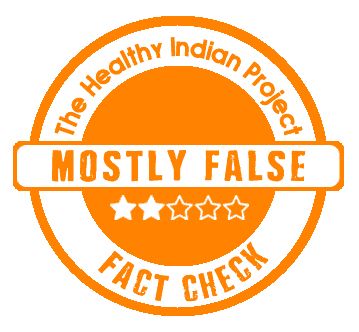Last Updated on March 25, 2024 by Neelam Singh
Quick Take
A popular Instagram post asserts that mustard gas is used in chemotherapy and that it is the natural source of cancer and the reason for its recurrence. We verified the claim and analysed that it is Mostly False.

The Claim
In a widely shared Instagram post, it has been suggested that chemotherapy naturally induces cancer. Furthermore, the post claims that all chemotherapy drugs are made of mustard gas, which has an acidic composition. Chemotherapy shrinks the tumour and may put the patient’s cancer in remission for a few years, but because it attacks healthy cells, it makes cancer reappear.

After doing extensive research, we discovered that other social media posts suggested using turmeric, practicing meditation, and soaking almonds to combat cancer. We have thoroughly fact-checked these assertions to ensure their accuracy.
Fact Check
What is meant by the term ‘mustard gas’? What part does it play in cancer management?
Mustard gas was a potent weapon used in the First World War. Severe skin blisters and excruciatingly painful, maybe lethal respiratory problems result from its exposure. The detrimental effects of the gas become noticeable hours after exposure. This ultimately complicates both its evaluation and therapy.
Nonetheless, mustard gas’s unexpected conversion from a weapon of mass destruction to an anti-cancer treatment is what gives it its place in the management of cancer. It should be emphasised that researchers turned mustard chemicals into chemotherapeutic treatments during World War II. These medications were developed from sulphur mustard, sometimes referred to as mustard gas. Later, these derivatives were developed to combat cancer growth. This transformation is the result of their destructive potential, which has been used by scientists as a chemotherapeutic medication. However, derivatives of mustard gas are still vital in modern oncology due to continuous research and development. This highlights the evolution of cancer treatment from the front lines of battle to modern cancer treatment.
Is chemotherapy solely responsible for the recurrence of cancer?
No, not really. The term ‘recurrence of cancer’ describes the disease’s reappearance following a period of remission or after successful cancer treatment. This typically occurs when cancer cells make it through the first round of therapy. This recurrence manifests as resistance to treatment or as dormancy within the body that subsequently reactivates.
It should be made clear, though, that not all chemotherapy medicines are directly to blame for cancer recurrence. The goal of the chemotherapy is to wipe out abnormal cancer cells. Yet, certain medical procedures might unintentionally spare cancer stem cells. This might trigger the recurrence of cancer.
It should be mentioned that derivatives of mustard gas derivatives were among the initial chemotherapeutic agents to be developed due to their ability to prevent cell growth. In addition, these derivatives such as Mustard Nitrogen are alkaline. However, since then, advances in chemotherapy have led to the development of an extensive range of chemotherapeutics that specifically target various forms of cancerous cell proliferation.
Chemotherapeutic medications belong to several chemical classes. These include alkylating agents, antimetabolites, and topoisomerase inhibitors, among others. These therapies typically work by interfering with particular aspects of the biology of cancer cells. However, it should be clarified that mustard gas derivatives made up very little of the early development of chemotherapy; instead, modern chemotherapeutic medications are specifically designed to target certain forms of cancer. Furthermore, the focus of current research is developing innovative remedies to counter medication resistance and enhance results for individuals fighting recurrent cancer.

When we asked Dr. Rakesh Kumar Sharma, MBBS, MD (Internal Medicine), DM (Oncology), about whether chemotherapy is exclusively to blame for cancer recurrences, Sir clarified that while the initial chemotherapy drugs were derivatives of mustard gas, not all chemotherapy drugs are based on this formulation. As modern chemotherapeutics are so advanced, systemic chemotherapy is a frequently employed treatment option for advanced-stage malignancies. Furthermore, the recurrence of cancer is a complex process that is influenced by type, tumour biology, and so on. Therefore, consulting a medical professional is advised.
Moreover, a multitude of factors impact the recurrence of cancer. They include the type and stage of the cancer as well as each patient’s response to treatment. Please be mindful of the fact that the recurrence of cancer poses significant challenges for patient care and may necessitate professional and personalised management. Therefore, chemotherapy remains an essential part of cancer treatment and is often used in conjunction with other risk-reducing adjuvants.
Does chemotherapy benefit the management of cancer?
Yes. Chemotherapy is a critical cancer treatment modality. Cancer is a complicated condition characterised by multiplication and the uncontrollable spread of abnormal cells in the body. Cancer-causing cells have the capacity to multiply into tumorous growths, damage organ systems, and metastasize other body areas. Consequently, the chemotherapeutic strategy entails the administration of medication to eradicate the cancer cells and impede their growth.
Chemotherapy is systemic in nature, in contrast to radiation therapy or surgery, which concentrate on specific regions of the body. This medication is effective against both benign tumours and metastatic spread because it may reach cancer cells anywhere in the body.
It should be mentioned that there are possible adverse reactions, just like with any other treatment. Chemotherapy can kill cancer cells, but its potential to harm healthy cells—causing hair loss, nausea, and exhaustion—must not be understated. Hence, chemotherapy plays a multifaceted role in cancer management, which offers hope to patients battling with cancer.
Disclaimer: Medical Science is an ever evolving field. We strive to keep this page updated. In case you notice any discrepancy in the content, please inform us at [email protected]. You can futher read our Correction Policy here. Never disregard professional medical advice or delay seeking medical treatment because of something you have read on or accessed through this website or it's social media channels. Read our Full Disclaimer Here for further information.

